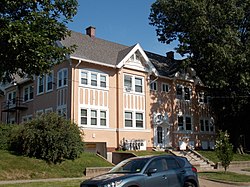Cork Hill District
|
Cork Hill District
|
|

Eight-Gables at 1117 Perry Street
|
|
| Location | Perry, Pershing, Iowa, 11th, 12th, and 13th Streets, Davenport, Iowa |
|---|---|
| Coordinates | 41°31′54″N 90°34′18″W / 41.53167°N 90.57167°WCoordinates: 41°31′54″N 90°34′18″W / 41.53167°N 90.57167°W |
| Area | 18.7 acres (7.6 ha) |
| Architect | Multiple |
| Architectural style |
Greek Revival Italianate Victorian |
| MPS | Davenport MRA |
| NRHP Reference # | 84001334 |
| Added to NRHP | May 16, 1984 |
The Cork Hill District is located on a bluff northeast of downtown Davenport, Iowa, United States. It is listed on the National Register of Historic Places in 1984. The historic district covers 18.7-acre (7.6 ha) and stretches from the campus of Palmer College of Chiropractic on the west to the Sacred Heart Cathedral Complex on the east. It is the western half of a neighborhood of the same name. When listed, the district included 12 contributing buildings. It includes Greek Revival, Italianate, and Victorian architecture. The property was covered in a 1982 study of Davenport MRA and/or its 1983 follow-on.
Cork Hill itself is the western section of a larger area of Davenport known as the LeClaire Reserve, named after the landowner and city founder Antoine LeClaire. It was a large Yankee-Irish neighborhood on the east side of town. The houses of the Cork Hill District reflect the long history of development of the LeClaire Reserve. The area developed in an unsystematic fashion that resulted in a mixture of architectural forms and styles on every block. LeClaire himself built his home in the Reserve in 1855 and St. Margaret’s Church in 1856. Other prominent families, such as the French’s, also moved to the area. The family of industrialists were also patrons of the arts and literature in the city. Alice French, whose pen name was Octave Thanet, was known as the first Iowa author with a national reputation.
The Irish started moving to Davenport after the Great Famine in Ireland of the 1840s and 1850s. Because large numbers of Irish immigrants settled around St. Margaret’s Church, the area became known as Cork Hill. Many of the Irish who located here were laborers who worked for the railroads or in the mills along the Mississippi River. Most of the houses belonging to the Irish families were replaced at the end of the 19th century and the beginning of the 20th century by larger dwellings. However, because of this early association with the Irish the area surrounding Sacred Heart Cathedral, which replaced St. Margaret’s in 1891, continues to be referred to as Cork Hill.
...
Wikipedia


